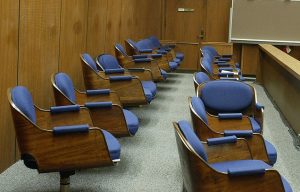Quarantining For Criminal Defense Attorneys: What’s Great, What’s Bad
We all soldier on.

(Photo by Fred Prouser-Pool/Getty Images)
A lot of this COVID-19 quarantining has bordered on the surreal. Daily life has changed so much since March that 2020 seems to have been sucked into a black hole.
Nonetheless, we all soldier on. Some aspects of the quarantine have made me a better lawyer. Others, not so much.

Is The Future Of Law Distributed? Lessons From The Tech Adoption Curve
First, the good stuff.
1) I can take as many CLE classes as I want. Virtual CLEs are amazing. You can wear whatever you want, be wherever you want, and catch up on everything you’ve missed because never before did you have enough time. I’m not taking classes on broadscope issues like “How to Try a Case,” but on more obscure subjects like, “why what that prosecutor implied (not even said) during summation is objectionable.” It’s great to have time to delve further.
2) I can speak to my clients as often as I’d like (albeit at half-hour intervals) without leaving my house. Who would have thought that due to the magic of the internet, I’d be able to see my clients from my own laptop without having to schlepp to jail or having them schlepped to court. No more getting stuck in cold prison waiting rooms for hours, now I just make an appointment, press a button, and the inmate’s there.
3) Because I can see my clients more easily, and there’s nothing new to report about their cases, my role has grown from that of a litigator to psychologist, mother figure, and general hand-holder. It’s a skill worth developing in any line of lawyering work, but especially for lawyers who work with clients stuck in jail, needing to know that someone from the outside is paying attention and cares.
Sponsored

Legal AI: 3 Steps Law Firms Should Take Now

Is The Future Of Law Distributed? Lessons From The Tech Adoption Curve

The Business Case For AI At Your Law Firm


Early Adopters Of Legal AI Gaining Competitive Edge In Marketplace
4) I have reams of time to prepare my cases for trial. No longer am I wasting four hours a day in court waiting for my cases to be called or commuting to work. I can pore over the most complex discovery, take copious notes, and mull over strategy. Instead of feeling like the train’s about to leave the station and I’ve got to run my fastest to catch it, I’m actually on the train and sitting down.
5) I can intersperse my workday — looking at gruesome evidence, reading grand jury minutes, and listening to taped phone calls among defendants, etc. — with taking a walk, attending a Zoom yoga class, or just staring out at the window at trees instead of a high-rise building blocking my view.
6) I’m home before dark (because I’m home all day).
Now, the bad stuff.
1) My clients know they can reach me any time of day or night, and they do.
Sponsored

Early Adopters Of Legal AI Gaining Competitive Edge In Marketplace

Navigating Financial Success by Avoiding Common Pitfalls and Maximizing Firm Performance
2) Weekends are meaningless. There’s no longer a differentiation between Monday to Friday and Monday to Sunday. Nine to five is out the window. Work and home life have morphed into one.
3) I get lonely. I miss the camaraderie of colleagues. True we sat in court for hours waiting for our cases to be called, but those hours were often entertaining. We caught up on gossip, watched lawyers lawyer, and sometimes even discussed the law.
4) We’re all in limbo. No matter how caught up with a case you are, knowing there’s no trial looming in the future tends to make all those details of discovery turn fuzzy. My mind’s always sharpest when I’m prepping for trial that I know is starting Monday. There’s no “Monday” right now.
5) How many times can I tell my clients — just be patient, we’ll eventually get to trial. A Judge told me last week that in Manhattan alone, there are at least 1,000 cases ready to be tried, with nowhere to go.
Picture that. When trials resume, more than 1,000 cases will already be at the starting gate. The average trial takes approximately eight days (many cases are longer). That’s at best. That means if there were three trials a month per judge (in Manhattan there are approximately 25 full-time trial judges), the system might be able to get through approximately 75 cases per month (once a vaccine is widely disseminated) — so we’re talking about a full 13 months just to get through the backlog, forget about the new cases that become trial ready in the interim.
That’s a lot of time for clients to sit in jail hoping they don’t get COVID-19 and awaiting their day in court.
And you thought you had it bad.
Toni Messina has tried over 100 cases and has been practicing criminal law and immigration since 1990. You can follow her on Twitter: @tonitamess.







